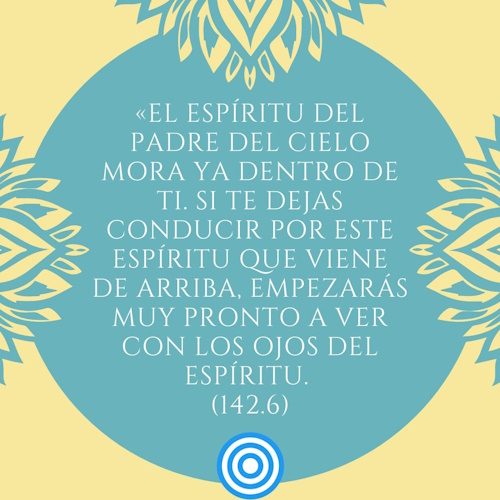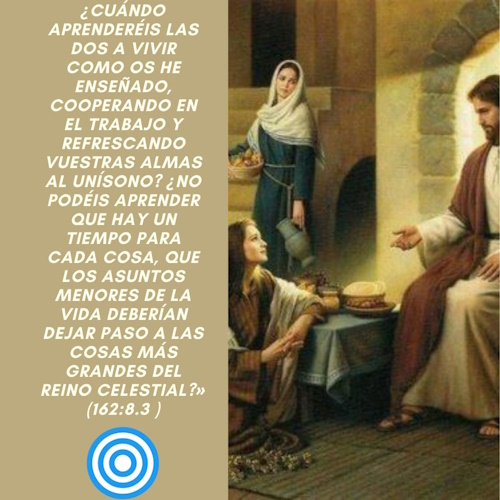© 2022 María José Sánchez Santamaría
© 2022 Urantia Association of Spain

¶ Transformation into God
Throughout history we meet multiple beings that show us how we can progress spiritually and that allow us to join forces, team up with them, have more allies in this essential task on Earth.
In 1584 a simple friar, Saint John of the Cross, wrote to a friend: “The most perfect degree of perfection that can be reached in this life is transformation into God.”
“The transformation in God” is the crucial experience in our lives, a colossal process, a being born again… dying to a way of life based on the little self (egocentrism, materialism, dehumanization, denaturing, etc.) and resurrecting in life , that is, being born to another way of living, coherent and consistent with one’s own divine nature.
Of this peculiar metamorphosis, of this new birth, Christ already spoke many centuries ago with Nicodemus, a distinguished member of the Sanhedrin. Someone who belonged to an institution concerned with preserving the fossilized truth, interested in preserving privileges and economic ties with political power, was received by Jesus of Nazareth with serenity, seriousness and dignity. In response to his questions, Jesus replied: “Truly, truly, I tell you, Nicodemus, whoever is not born from above cannot see the kingdom of God.”
To Nicodemus’s perplexity, Jesus replied:
“Already does the spirit of the Father in heaven indwell you. If you would be led by this spirit from above, very soon would you begin to see with the eyes of the spirit, and then by the wholehearted choice of spirit guidance would you be born of the spirit since your only purpose in living would be to do the will of your Father who is in heaven. And so finding yourself born of the spirit and happily in the kingdom of God, you would begin to bear in your daily life the abundant fruits of the spirit.”
Nicodemus was thoroughly sincere. He was deeply impressed but went away bewildered. Nicodemus was accomplished in self-development, in self-restraint, and even in high moral qualities. He was refined, egoistic, and altruistic; but he did not know how to submit his will to the will of the divine Father as a little child is willing to submit to the guidance and leading of a wise and loving earthly father, thereby becoming in reality a son of God, a progressive heir of the eternal kingdom. (UB 142:6.7-8)
This radical change that implies submitting our will to a greater instance (stubborn reality forcefully shows us) is usually promoted by experiences of suffering; these are the ones that most promote awareness and spiritual evolution. This is so because of the upheavals (sometimes authentic seismic movements) that they make us experience. These removals have the virtue of taking us out of our comfort zone, from sterile distraction, from attachment to material comfort.
Based on these experiences of suffering, we ask ourselves questions that we would not have asked ourselves before, we become interested in issues and topics that would never have attracted us before, we get closer to people we would never have approached, we watch movies or videos that we would not have been interested in before. interested, we read books that, due to their content, we would not have read before, etc.
In the poem “Dark Night”, Saint John of the Cross left an incomparable testimony, due to its depth and beauty, of the transforming power of suffering, of which night is a metaphor. Here an excerpt:
“Oh night you guided!
Oh kind night
more than the dawn!
Oh night that you joined Beloved with beloved,
beloved into the Beloved transformed!”
How beautiful what he tells us: joining the Beloved (God) with the beloved (our soul), transforming the beloved into the Beloved…
All of this is a wake-up call for those who want to spend their life on earth without experiencing shocks or shocks, in a comfortable, peaceful and self-satisfied context from which they will be able to extract little juice in terms of the expansion of consciousness.
The curious thing is that precisely these shocks or earthquakes that life has and that make us grow spiritually also allow us to become more firmly rooted in what is unalterable. It really does not matter what happens outside, the storms that remove our existence, as long as we are anchored with our most sacred intimacy. Saint John of the Cross tells us in a poem:
“Stay me and forget me,
I reclined my face on the Beloved;
everything ceased, and leave me,
leaving my care
among the forgotten lilies.”
That closeness to the divine spark makes this great poet say something as beautiful as that he left his care, his worries “forgotten among the lilies.”
The connection with divinity is totally necessary, otherwise, the activity becomes an incessant whirlwind that keeps us trapped in the merely mundane or material, distracted like Marta (the sister of Lazarus and Mary), who according to the UB, had tendency to “disperse yourself with numerous unnecessary tasks and become overwhelmed with trivial concerns”.
As Martha busied herself with all these supposed duties, she was perturbed because Mary did nothing to help. Therefore she went to Jesus and said: “Master, do you not care that my sister has left me alone to do all of the serving? Will you not bid her to come and help me?” Jesus answered: “Martha, Martha, why are you always anxious about so many things and troubled by so many trifles? Only one thing is really worth while, and since Mary has chosen this good and needful part, I shall not take it away from her. But when will both of you learn to live as I have taught you: both serving in co-operation and both refreshing your souls in unison? Can you not learn that there is a time for everything—that the lesser matters of life should give way before the greater things of the heavenly kingdom?” (UB 162:8.3)

Jesus himself tells us that both action and meditation are necessary, but they have their time, we should know what is the right thing to do here and now. At that moment of meeting Jesus in Bethany with the beloved three brothers, it was time for a friendly encounter, peace and spiritual connection. There would already be room for the other activities that Jewish hospitality entailed. There would be times for cooperation in work and times to refresh souls.
These two aspects, the inner and the outer, have their place in life; and they must be deployed in balance, knowing that the base is in introspection and using this as a support for the external action that must be deployed.
This aspect is closely linked to the famous mandate of Jesus’ last supper:
And so I give you this new commandment: That you love one another even as I have loved you. And by this will all men know that you are my disciples if you thus love one another. (UB 180:1.1)
Jesus has loved us so deeply, knowing the great value that human beings have, with a divine spark and a soul unfolding in our thoughts, that he also invites us to realize his existence in all other human beings, as they exist in us. themselves.
How do you live everyday life, from moment to moment, from then on? Or better, how do I live?
Let’s see what the great John of the Cross recommends, taking the example of Christ and following in his footsteps. He summed it up masterfully in his “Spiritual Canticle” when he wrote that the creatures had seen the Beloved pass by “a thousand graces pouring out”:
“Thank you very much spilling
he passed through these groves with haste;
y, looking at them
with just his figure,
dresses left them beautiful.”
Let us make this attitude our own, pouring out a thousand thanks as we go, making Heaven on Earth, showing the experience of God crystallized in the here and now.
Living pouring out good is within our reach, it is within your reach… because it is the characteristic of our divine nature.
Let us make a commitment to ourselves not to live in any other way, to live our moments in the way that Jesus of Nazareth showed us:
The very heart of the prayer which he taught his disciples was, “Your kingdom come; your will be done.” (UB 196:0.8)
Having thus conceived that the kingdom consisted of the will of God, he devoted himself to the cause of making it come true with admirable self-forgetfulness and boundless enthusiasm.